- Home
- Pat Conroy
My Reading Life Page 3
My Reading Life Read online
Page 3
Yet it is as a work of art that Gone with the Wind has been most suspect. From the beginning, the book has endured the incoming fire of some of the nation’s best critics. It is a book of Dickensian power, written after the dawn of the age of Joyce’s Ulysses. Its vigorous defense of the Confederacy was published three years before the German panzer divisions rolled across the borders of Poland. In the structure of Margaret Mitchell’s perfect society, slavery was an essential part of the unity and harmony of Southern life before Fort Sumter. No black man or woman can read this book and be sorry that this particular wind has gone. The Ku Klux Klan plays the same romanticized role it had in The Birth of a Nation and appears to be a benign combination of the Elks Club and a men’s equestrian society. Critics took the novel apart from the beginning, then watched as it proceeded to become the best-selling book in American history. Its flaws may have doomed a lesser book, but this one rode out into literary history with Rhett and Scarlett in complete command of the carriage.
Literature often has a soft spot for the lost cause. Defeat lends an air of tragedy and nostalgia that the victors find unnecessary. But history will forgive almost anything, except being outwritten. None can explain the devotion that Gone with the Wind has inspired from one generation to another, but one cannot let this ardor go unremarked upon either. Because its readers have held it in such high esteem, it has cheapened the book’s reputation as a work of art. Democracy works because of the will of the people, but it has the opposite effect when scholars begin to call out those books that make up the canon of our nation’s literature. Gone with the Wind has outlived a legion of critics and will bury another whole set of them after this century closes.
The novel works because it possesses the inexpressible magic where the art of pure storytelling rises above its ancient use and succeeds in explaining to a whole nation how it came to be this way. There has never been a reader or a writer who could figure out why this happens to only a very few books. It involves all the eerie mysteries of enchantment itself, the untouchable wizardry that occurs when a story, in all its fragile elegance, speaks to the times in a clear, original voice and answers some strange hungers and demands of the Zeitgeist. I know of no other thousand-page book that grants such pleasure. The characters are wonderful, and the story moves with bright, inexorable power. The book allows you to lose yourself in the glorious pleasures of reading itself, when all five senses ignite in the sheer happiness of narrative. The Civil War and its aftermath may not have felt like this at all, but it sure seems that way when one gets carried away in the irresistible tumult and surge of Gone with the Wind. This book demonstrates again and again that there is no passion more rewarding than reading itself, that it remains the best way to dream and to feel the sheer carnal joy of being fully and openly alive.
Gone with the Wind has many flaws, but it cannot, even now, be easily put down. It still glows and quivers with life. American letters will always be tiptoeing nervously around that room where Scarlett O’Hara dresses for the party at Twelve Oaks as the War Between the States begins to inch its way toward Tara.
CHAPTER THREE
THE TEACHER
My father confused me about what it meant to become a man. From an early age, I knew I didn’t want to be anything like the man he was. If I’d become a wife- or child beater, it would be only a matter of time before I would’ve severed the carotid artery that carried blood into the troubled countryside of my brain. Among his fellow marines, Donald Conroy’s horrible taste proved unerring, and he attracted a string of oddball friends who should’ve been eligible for any catch-and-release program. For the most part, they were third-rate men who spread rich marmalades of loathing over their own wives and children. I was on a lifelong search for a different kind of man. I wanted to attach my own moon of solitude to the strong attraction of a good man’s gravitational pull. I found that man by luck when I walked into Gene Norris’s English class in 1961. Though Gene couldn’t have survived a fistfight with any of the marines I had met, I knew I was in the presence of the exceptional and scrupulous man I’d been searching for my whole life. The certainty of his gentleness was like a clear shot of sunshine to me. I had met a great man, at last.
In my career, I’ve written enough about Gene Norris’s seminal role in my life to warrant Gene’s own demurral and note of complaint. Even from his hospital bed, he would scold me for my constant advocacy of him as the grand irreplaceable lodestar of my boyhood. Gene would remind me that I had other fine teachers at Beaufort High School and that I should concentrate on celebrating them instead of chattering on and on about his influence. I replied that all teachers could sustain themselves if they read about the English teacher who found a profoundly shy and battered young man and changed the course of his life with the extravagant passion he brought to his classroom. I tried to visit Gene every time he went to the hospital in Columbia to receive chemotherapy treatment for his leukemia, and he and I would talk for hours. I’d depart when he entered into a comalike sleep that would sometimes leave him trembling with its fierce possession. On occasion he would lash out and cuss me for wasting time with him when I could be working on my novel. Once he screamed at me when he heard I was writing an article about him for House Beautiful.
“Creature, do I look like a house to you?” Gene asked.
“Yeah, you do, Gene. You look like an outhouse.”
“Do I look beautiful to you, Irish Gypsy?” he yelled, drawing the attention of a pretty nurse.
“Anything wrong, Mr. Norris?” she inquired.
“Damn right,” Gene said. “Throw this scoundrel out with the morning trash. He’s a constant irritant and lowbrow to boot. He was born nothing. His family is nothing. He’s made a mess of his entire adult life. Call your largest orderly and have him thrown down the hospital steps on his ear.”
“Mr. Norris and I’ve been lovers for over twenty years,” I said to the nurse.
“I’ll be dammed if that’s so. Scram, young lady. There’s no telling what filth will spew from his treacherous lips. He’s capable of saying anything. There’s no muzzle or governor on his gas pedal to stop him or even slow him down. His humbuggery knows no limits.”
“Humbuggery?” I repeated. “I feel like I’m living in London. I’m visiting Charles Dickens.”
“You’re nothing but a knave and a flibbertigibbet,” Gene said, his eyes fixed on the nurse’s reaction.
“You need anything, Mr. Norris?” the nurse asked.
“Another visitor. Remove this scoundrel when you go,” he demanded. “Or you’ll be checking the want ads tomorrow morning. This is no idle threat, Nurse.”
“Thanks for what you’re doing for Mr. Norris,” I said to the nurse. “All the nurses have been wonderful.”
“We’re all in love with Mr. Norris,” she said as she shut the door.
“Hogwash. Just pure hogwash,” Gene said after she left; then he turned to me to say, “I think we put on a pretty good show. The nurses love it when we talk nonsense to each other. They love the piffle, the endless banter.”
“I need to be going, Gene.”
“What do you have better to do than visit your old English teacher?”
“Gotta get back to watch the fender on my Buick rust,” I said. “Then I got to buy work gloves at Belk’s.”
“Don’t go yet. Please. Tell me a story, one about us. Tell what it meant. How on earth did it happen? The story, Pat—tell it to me.”
Gene extended his left hand, and I took it with both hands and held it as I told him of the fifteen-year-old boy who did not know the name of another student at Beaufort High School. That boy had been taught by nuns and priests his whole life, and like most Catholic school veterans, he could diagram complicated English sentences as gracefully as a fly fisherman casting toward a still pool in a mountain stream.
The boy watched the teacher enter his class, surprised when the teacher noticed him standing beside his desk waiting for the teacher to lead the class in a prayer,
then granting permission for the class to take their seats. The teacher walked down the aisle and pushed the boy into his seat and said, “Just sit, boy. You must be some kind of fool or something.”
I was not a fool, Gene Norris, but one of the ways I found that out was by attaching my fate to the unprepossessing man who began by telling his students what he expected us to learn over the course of a year, the number of books he required us to read, and the quality of essays we would write. With English department funds, he had gotten each of us a subscription to The Atlantic Monthly and Harper’s Magazine. He expected us to have an intimate knowledge of current affairs and required that we become familiar with the New York Times. Segregation was still the law of the land in South Carolina. We were an all-white school with all-white teachers, but the world was changing at a bewildering pace around us, and we needed to make ourselves knowledgeable and informed as we ripened into students who would one day offer leadership to the communities we lived in. His eloquence was so understated that it was almost unnoticeable. He displayed a complete assurance in the composure and ease he brought to the art of teaching. At the end of the first day, I was impressed with the man; by the end of the first week, I was in love with him.
“There you go again,” Gene said when I paused in telling the story. “Always gilding the lily. Always exaggerating. From the very start, I tried to get you to tone it down, reel it in. Pull it back. But you were incapable of listening to a simple instruction. Oh, no, you did it your way, and no one else’s way counted for a thing.”
“Where did I exaggerate, Gene?”
“The love part. You talk about love like it’s for sale on the cheap. A week. You loved me after a week. What bull-oney. What shoddy thinking.”
“It wasn’t thinking. It was feeling.”
“You’ve already ruined the story,” he snapped. “I won’t listen to another word.”
“Let me defend myself. Over forty years have passed since I was your English student. Who is the man holding your hand in a Columbia hospital talking about a class so few remember? That whole class fell in love with you that year. I was a witness to it all. I remember everything.”
“Go on,” he said, relenting.
My first week in his class, Gene Norris played a record at the beginning of the period. It was called “The Death of Manolete,” a journalist’s awed account of a bull killing a legendary bullfighter during a corrida in Spain. Manolete’s footwork was magnetic and flawless and his cape work was a study in perfection as the great-horned beast and the clown-faced man performed a demonic ballet to the joyous applause of the crowds. But on that day, the prodigies of Manolete met the instinctive genius of a bull bred for combat, and the goring was terrible and forgotten by no one in attendance. I told Gene that he made us write an essay about what Manolete must have felt that day, or what the bull felt or what the men and women felt who watched in horror as Manolete was carried out on a stretcher.
“You wrote about how the bull felt,” Gene said. “The only one who ever did. That’s when I spotted you.”
On weekends, as I reminded Gene, he began to invite me to go “rambling” and we’d explore Charleston, Savannah, Bluffton, and Edisto Island. “You introduced me to every antique dealer in the Low Country,” I told him, including Mr. Schindler, whom I visited often during my cadet days at The Citadel. He always called me “the professor’s boy,” and his refinement and courtesy seemed to be native shrubs of Charleston itself. Those trips sealed Gene’s and my friendship forever and opened up a world I never imagined existed. “Then basketball season started,” I continued, “and you always drove part of the team in your car on road trips. I always sat next to you in the front seat. You made those trips wonderful adventures for all of us.”
“After the first game I teased you about being a star,” Gene said. “You blushed down to your toes. I said, ‘Lawdy, Lawdy, imagine little ol’ Gene Norris teaching a real star in my classroom. Praise the Lord, I’m not worthy of such an honor.’ ”
“You were a pain in the ass.”
“But I didn’t teach astronomy,” he continued, ignoring me. “I knew nothing about the heavenly bodies. What was I supposed to do with an actual star sitting in the front row of my classes? Buy a telescope? Read up on Galileo?”
In December 1961, Gene accompanied the basketball team on its annual road trip to Myrtle Beach. I stayed with the Diminich family, who owned an Italian restaurant named Roma, where I tasted both garlic and olive oil for the first time in my life. Gene enjoyed the shrimp scampi so much that he served it at dinner parties for the rest of his life. Gene picked me up after I attended Mass with the Diminich family on Sunday morning and drove me to the Chesterfield Inn for lunch. Myrtle Beach is a shoddy, unplanned city that looks like it killed all its architects before it approved a master plan for its construction. But Gene and his family had stayed at the elegant Chesterfield Inn for as long as he could remember. Guests ate on real china and Gene had to instruct me on which utensil to use as impeccably dressed waiters served the meal. He taught me how to unfold my napkin and spread it on my lap. The crowd was hushed and appreciative as they conversed in murmurous tones at the tables around us. According to Mr. Norris, the Chesterfield reminded him of an inn in London where he had stayed for two weeks.
“Ah, England. Ah, England. There’s such beauty there, Pat. Beauty beyond my powers to describe. How is your Dover sole?”
“It’s great, Mr. Norris. I love Dover sole.”
“That’s good to know. But you aren’t eating Dover sole, boy. That’s a South Carolina flounder with a gussied-up, royal name.”
“The biscuits sure are good,” I said.
“When you are enjoying a superb cuisine in a marvelous restaurant like this one, elevate your language, Pat. Make your conversation fresh and exciting. Speak about the noble art of bread making. These biscuits are the grand result of hundreds of years of trial and error. At the table, bring up ideas, talk philosophy. To be boring is not just a sin; it’s a crime.”
“These biscuits sure are good, Mr. Norris,” I said, and he laughed with pleasure.
“Scalawag. What am I going to do about you, scalawag?”
The rest of the team had left early for Beaufort, and Mr. Norris drove down Highway 17 at a leisurely pace, taking time to show me the antebellum homes in the small coastal town of Georgetown and lamenting the fact that all the antique stores were closed up on the Sabbath. Passing by the Sunset Lodge, he commented dryly that it was the largest whorehouse in South Carolina and one of its most popular tourist destinations. Wide-eyed with curiosity, I stared at the unimpressive motor lodge, half expecting volcanic smoke to rise out of the provenance of such corruption. I stared hard at those contaminated grounds hoping that scantily clad beauties with For Sale signs hanging from their necks would prance into view.
“This place even smells funny,” I said to Mr. Norris.
“You ain’t smelling no women, son,” he said. “That’s the paper mill we just passed in Georgetown.”
A mist was rising off the Santee River as we crossed the bridge heading toward Charleston. Several times, Gene had checked his wristwatch and now he took a hard right down an uninhabited country road that ran parallel to the Santee itself. For several miles we rode in silence until he turned into a road at a small sign that said, HAMPTON PLANTATION, 1735.
Driving up in front of the many-columned plantation house, Gene ordered me to comb my hair and straighten myself up. He insisted that I put my thoughts in shipshape order and hold up my end of the conversation with both wit and decorum. He had arranged for me to meet the most famous writer in South Carolina, and he demanded that I be cordial, inquisitive, and respectful. A tall, distinguished man with impeccable manners and a courtly demeanor greeted us at the front door.
“Hello, Mr. Norris,” he said. “It’s a pleasure to see you again. Is this the young man you spoke so highly of?”
“It certainly is. The young man’s name is Pat Conroy. This is t
he poet laureate of South Carolina, Mr. Archibald Rutledge.”
“It’s an honor to meet you, sir.” I said it in a state of shock that I was meeting a writer for the first time in my life.
“Mr. Norris tells me that you show a rare aptitude in your work. Do you prefer poetry or prose?”
“I’d like to be a poet, sir,” I said. Mr. Rutledge was straight backed and well groomed and as crisp as a stalk of celery. He wore leather patches at the elbows of his sports coat and demonstrated an innate courtliness that I couldn’t imitate in a hundred years. He introduced us to his wife, Alice Rutledge; then he led me into his study, where he composed his poetry and kept his books. He had stocked his shelves with leather-bound sets and the room smelled of tobacco smoke and tannery hides. His voice was calm, modulated, and unrushed. Though his inflections were Southern, they were highborn and polished beneath the fretwork of manor houses. Lifting a piece of paper from his desk, he read a new poem he had written out in a handwriting that looked to me like jasmine weaving through a trellis. He read two rhyming stanzas to me, then said, “How do you like them, Mr. Conroy?”
“I wish I’d written them, sir,” I said.
“A high compliment, young man,” Archibald Rutledge said. “How would you improve them?”
“I don’t think I could.”
“Writing can always be improved,” he told me. “Please help me improve this first draft.”
“A stronger rhyme at the end of the first stanza,” I suggested.
“A fair observation,” he said, studying his poem in embryo. “I’ll take your advice into consideration.”
Then Archibald Rutledge took me on a leisurely tour of his home, pointing out felicities of style and architectural ornament that he found significant. We toured the gardens and he walked me down a pathway to the forest that crowded up to the edge of the plantation. He knelt down to show me where a white-tailed buck had sharpened his antlers against a cypress tree before the beginning of mating season. He suggested that I make the close observation of nature part of my life’s work and that I learn the actual names of things, saying that specifics always proved fruitful to the validity of any narrative.

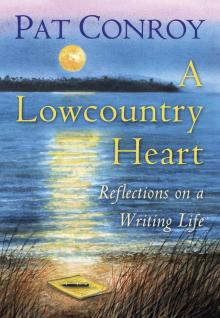 A Lowcountry Heart: Reflections on a Writing Life
A Lowcountry Heart: Reflections on a Writing Life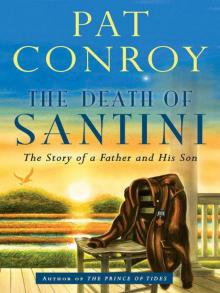 The Death of Santini: The Story of a Father and His Son
The Death of Santini: The Story of a Father and His Son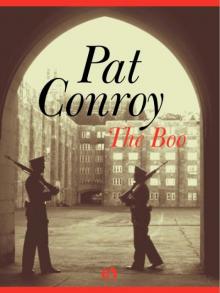 The Boo
The Boo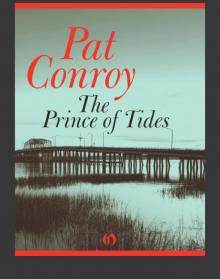 The Prince of Tides
The Prince of Tides Beach Music
Beach Music The Water Is Wide
The Water Is Wide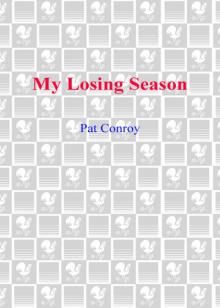 My Losing Season
My Losing Season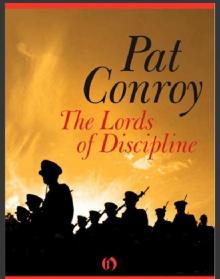 The Lords of Discipline
The Lords of Discipline Pat Conroy Cookbook
Pat Conroy Cookbook My Reading Life
My Reading Life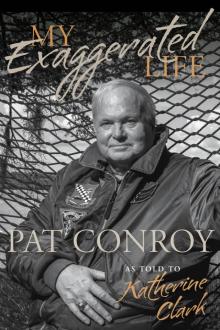 My Exaggerated Life
My Exaggerated Life The Pat Conroy Cookbook
The Pat Conroy Cookbook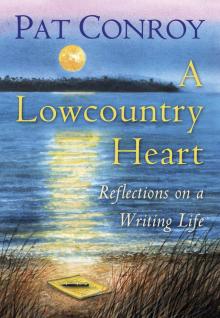 A Lowcountry Heart
A Lowcountry Heart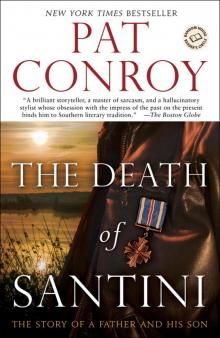 The Death of Santini
The Death of Santini